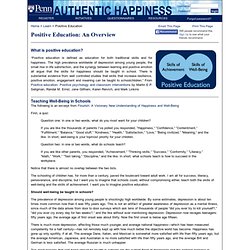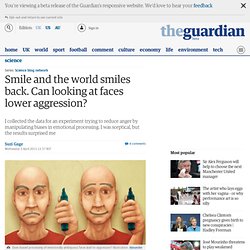

Rewire Your Brain for Positivity and Happiness Using the Tetris Effect. Using the new Positive Psychology. Using the new Positive Psychology. Teaching Well-Being in SchoolsThe following is an excerpt from Flourish: A Visionary New Understanding of Happiness and Well-Being First, a quiz: Question one: in one or two words, what do you most want for your children?

If you are like the thousands of parents I’ve polled you responded, “Happiness,” “Confidence,” “Contentment,” “Fulfillment,” “Balance,” “Good stuff,” “Kindness,” “Health,” “Satisfaction,” “Love,” “Being civilized,” “Meaning,” and the like. In short, well-being is your topmost priority for your children.Question two: in one or two words, what do schools teach? If you are like other parents, you responded, “Achievement,” “Thinking skills,” “Success,” “Conformity,” “Literacy,” “Math,” “Work,” “Test taking,” “Discipline,” and the like.
Notice that there is almost no overlap between the two lists. The schooling of children has, for more than a century, paved the boulevard toward adult work. THE SCIENCE OF HAPPINESS. (DANIEL GILBERT:) When people think of "science," they naturally think of atoms, planets, robots — things they can touch and see.

They know that subjective experiences such as happiness are important, but they believe that such experiences can't be studied scientifically. That belief is dead wrong. What does it take to study something scientifically? One word: Measurement. If you can measure something, you can study it scientifically. But just to be consistent, you should also discard your glasses or contact lenses, because optometry is another one of those sciences that is built entirely on people's reports of subjective experience.
On the basis of your answers, the optometrist is able to create a lens that corrects your vision quite precisely. People often bristle at the suggestion that human behavior is merely an attempt to attain happiness. The second argument is also wrong. This sounds like a semantic abstraction, and it isn't. We're all told that variety is the spice of life. Smile and the world smiles back. Can looking at faces lower aggression? Before I started my PhD, I worked as a "research assistant".

That's a fancy title for an academic dogsbody; well, it can be. I was lucky and had some great bosses in the five years I had that job, but sometimes it can involve menial tasks like data entry, or running experiments you think are a complete waste of time. One such experiment, that I was asked to run by my boss while we waited for ethics approval on another study, was published last week in the journal Psychological Science.
Shows what I know! It showed that a simple task involving looking at faces and judging their emotion could reduce anger and aggression in a population of aggressive young people, and a group of controls at Bristol University. When I was asked to run the experiment, I was sceptical because it was a novel way to try and reduce aggression. The premise is: perhaps aggression is at least in part caused by biases in emotion perception. The experiment was simple. Study Shows Seeing Smiles Can Lower Aggression. A happy face can certainly lift spirits, but can it reduce rage?

Studies have documented that the physical act of smiling is a universal, and effective way to lift mood, if briefly. But in the latest research on the power of the smile, researchers led by Marcus Munafo of the University of Bristol in England found that even seeing smiles on the faces of others can have a profound effect on a person’s tendency toward violence or aggression— that is, as long as that person recognizes the smile as one of happiness, and not as a sneer. Munafo and his colleagues conducted a series of experiments involving normal adults as well as highly aggressive teens who had been referred to a youth program, either by educational authorities or the courts. About 70% of the teens already had a criminal record. (MORE: How to Lift Your Mood? What makes us happy? Seeing happiness. The health benefits of happiness.
In the Scottish Borders they are trying out a new and quite unusual kind of medicine - happiness.

Now it is claimed that happiness could be more important than smoking in determining your health. Dr Derek Cox, Director of Public Health at Dumfries and Galloway NHS, suspects that for decades health professionals have been missing a big trick in improving the health of the nation. "We've spent years saying that giving up smoking could be the single most important thing that we could do for the health of the nation.
"And yet there is mounting evidence that happiness might be at least as powerful a predictor, if not a more powerful predictor than some of the other lifestyle factors that we talk about in terms of cigarette smoking, diet, physical activity and those kind of things. " Like everyone else, for years he tried to prevent ill-health by anti-smoking and healthy lifestyle campaigns. But there was little change. So he started looking into the health benefits of happiness. Long life Happy talk.